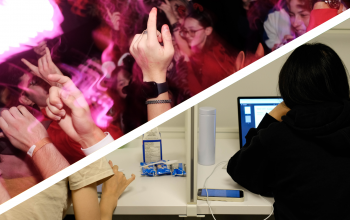How to process global conflict intentionally and actively
Stefanie Menezes, Lifestyle Editor
The world often appears to be an unending maelstrom of tragedy and conflict, and we, as individuals in Western society, often find ourselves stuck in the centre. All we can do is observe as the turmoil continues. We are spun and thrown by the storm, yet powerless to its mighty whims. The choice often comes down to agonizing over each turn of events, or mentally distancing ourselves from politics altogether to protect ourselves from the never-ending influx of devastation. Neither alternative is great, but what else can we do?
There are several problems with this view, and they all parallel the self-centred approach that much of Western society takes to world issues. First, to put ourselves in the centre of the storm is vain, and assuming a state of powerlessness simply because we have no control over the outcome of a given conflict is willfully ignorant. We do not have to check out of political issues to preserve our mental health — we must stop making global crises about ourselves and our feelings. There are three strategies you can use to take hold of your rational and active political power: control your emotions, limit social media, and know what your responsibilities are.
Though it is crucial to control your emotions, this is not to say that we should not be invested in global issues, nor is it a sign of weakness to be moved by the tragic circumstances of others. We are human and anything we repress will find a way back into our lives, so it is vital to make space for our emotions. Watching the victims of these crises suffer should cause us to feel anger, despair, and grief. Those feelings remind us how deeply we care for others, and we should meet our emotions with compassion and kindness. However, if we truly care about those affected by war, violence, and poverty, then the space we reserve to process emotions cannot be the same space in which we process information.
The role of emotion in our ability to perceive situations accurately was a controversial topic long before we began to recognize political burnout. Seneca’s On Anger explains not only how, but why it is necessary to control emotion with reason. It has become a common belief that we should let anger be our driving force in political matters because it will “rouse the spirit” and fortify our stance. We tend to believe that when anger is our motivation, we will yell louder and therefore be heard. Seneca addresses both this very assumption and its fatal flaw in the same figurative breath: “This is the goad which stirs up bold men and sends them to encounter perils.” When emotion takes over our politics, our ability to discriminate facts from misinformation grows weak. The truth may be worse, and it may force us to re-evaluate our values, ideologies, and affiliations, but it is worth uncovering — because without the truth, real advocacy devolves into the act of yelling simply for the sake of being heard.
We in North America are not the direct victims of these wars. Social media encourages many unhealthy attitudes, but perhaps one of the most detrimental to the development of our society is the self-centric view of politics. I say this as a woman of colour myself: if we cannot separate our identities from our politics, not only is burnout inevitable, but our activism is rendered ineffectual. Those who are in the middle of the violence, fearing for their lives and the lives of their loved ones — even those among us with family living in these critical conditions — have the right to be angry and overwhelmed with emotion to the point of inaction or irrational action. They have the burden of being inseparable from the issue and the unfortunate license to partiality.
Human rights issues should be the concern of every individual; however, the ways in which directly affected populations and outsiders to a conflict can meet these issues are drastically unequal. Arundhati Roy, author of God of Small Things, has a quote that accurately describes our Western need to be the voice for the voiceless: “There is really no such thing as the ‘voiceless.’ There are only the deliberately silenced, or the preferably unheard.” We must leave the anger to those directly involved and do our part to ensure that they can express it. The only reason that we feel powerless in the face of this conflict is we submit to our tendency to adopt feelings and responsibilities that are not ours while neglecting those that are. It is natural to feel empathy for those who are suffering, but to let our emotion outweigh the interest of the actual victims is irresponsible and makes us complicit in silencing them. Our sense of justice should not come from our own affiliations, but from what is true for a given situation. As an external party to an issue, we have the privilege to be objective and should not neglect it.
One of the most significant factors that inhibit our access to objectivity, and the main reason that we experience political burnout, is our generation’s consumption of social media. These platforms have the potential to help us grow more well-informed, but the way in which many people encounter and interact with global issues through social media is counterproductive because they do not dissect and examine the information they consume.
The first step to using our power is to recognize when our activism becomes performative and even harmful. In acknowledging that our generation has unfettered access to the internet, we must recognize that currently, more pressing than lack of awareness, is widespread misinformation and its polarizing effects on society. On social media, I often notice countless people reposting the same selection of infographics that can be disproved with a few minutes of research. This is one result of our uncontrolled anger: we become so consumed by our ideologies and affiliations that we stop caring about the truth. We effectively become slaves to our passion and neglect our reason, just as Seneca described. There is a simple way to avoid this cycle, and it is to seek two things at all times: the objective facts of a given situation and a realistic understanding of how we can contribute.
For any given conflict, even those that seem entirely clear-cut, look to the history and learn the events that led to the current condition. There is no excuse for being uninformed or unaware regarding issues that we claim to be passionate about. If we have time to repost an infographic, we have time to check the facts first, by reading through articles from unbiased and biased sources from both sides. Mindless consumption of media is what causes us to feel devastated: we see one side as victims and the other as the enemy, and we naturally identify with the victim even when it is not our place to do so. Our place is to know what is true and untrue in a given situation by distinguishing objective facts from media narratives, and only then can we recognize what our responsibility is.
Knowing the facts about a situation is not only a shield against being exhausted by sensationalist media, but it can also help us accurately assess the needs of a community in crisis. It is very unlikely that the actions of citizens of a North American country are going to cause a ceasefire across the globe. Our own governments may hear us, but the unfortunate reality is that global powers will play a far greater role and will choose a course of action based on their own interests. Change is a slow process, and we can continue to erode the way that such institutions run, but that does not benefit the lives of the people that are suffering right now. If the only changes we seek are to increase awareness and implement policy changes within an unrealistic timeline, then we do not just feel powerless: we are choosing not to use our power. When we choose a form of activism that is not appropriate to a particular issue, we are favouring the performative over the effective. In being well-informed about a given issue, we know where to focus our efforts. Additionally, when we are aware of how countries and organizations use the funds we give, we can be intentional with our donations. We cannot knowingly send money to a questionable cause and then claim that we “did our part.”
Another reason that we become so burnt out is because our focus is on the wrong place. There is a lot of anger on social media aimed at those who choose not to speak out about political issues, which is an ironic reflection of current social attitudes: those who do not speak out are seen to be inactive, while those who speak out against the predominant opinion are condemned for their alignments. Instead of being so concerned with what our social media mutuals are or are not doing, our goal should be to get involved in tangible ways. It is important to remember that just because someone is not posting about their activism does not mean they are not working for a cause outside of social media. The internet is often an angry place no matter what your stance is, and we should not condemn people for operating outside of it. There are countless opportunities to volunteer and help provide aid to those affected by violence and war, but they are neither as flashy nor as divisive as the efforts that social media encourages. We cannot complain about feeling powerless when we render our own activism ineffectual.
The maelstrom is not ours to experience, but it does rage on despite our best efforts. As individuals, we cannot stop it, but we can impact the lives of those involved. We are not powerless if we stay informed, critical, and committed to the truth. And we can do our part if we acknowledge the ability and privilege afforded to us by living in Canada, with unlimited access to information and tangible opportunities to support victims of violence and war across the world. The world is not hopeless if we each do our part.



